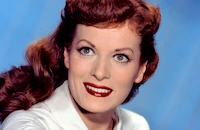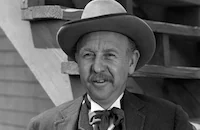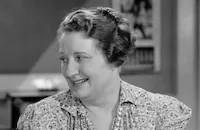Sitting Pretty

Brief Synopsis
Cast & Crew
Walter Lang
Robert Young
Maureen O'hara
Clifton Webb
Richard Haydn
Louise Albritton
Film Details
Technical Specs

Synopsis
Harry and Tacey King enjoy an idyllic life in a pleasant suburb known as Hummingbird Hill. However, problems arise when their resident maid quits because she can no longer deal with the Kings's three young boys Larry, Tony and Roddy, and the enormous family dog. Harry, a lawyer, and Tacey as well as another young couple, Bill and Edna Philby, are invited to dinner at the home of Harry's boss and neighbor Mr. Hammond. They have difficulty finding a baby sitter for the evening and have to settle for Ginger, a sixteen-year-old with a crush on Harry. After dinner, the Hammonds and their guests are visited by their mutual neighbor, the prissy, nosy Mr. Appleton, who has come to deliver a letter he has received in error. He tells the Kings that he is surprised to see them there as he thought they would be at their own party. Harry and Tacey rush home and find that Ginger has invited a number of her friends over for a loud dance party. Because of this incident, Tacey places an advertisement for a resident nanny. After a series of telegrams are exchanged, the Kings decide to hire Lynn Belvedere, who has an impressive list of qualifications. While Harry is waiting at the train station for his new employee, who he assumes is a woman, a gentleman comes to the Kings's house and announces that he is Lynn Belvedere, a genius who has mastered many professions. Although uneasy about hiring a man, the Kings decide to give him a trial for a few days. Within a matter of hours, Mr. Belvedere has won the children over, fixed the ice box, subdued the rambunctious dog, given the baby a bath and prepared a superb dinner salad. He soon establishes himself in Hummingbird Hill and proves a worthy adversary to Appleton. There are times, however, when the genius gets on Harry's nerves. In addition, Harry is concerned about leaving Tacey and Mr. Belvedere alone together while he goes on a business trip and asks her to sleep at the Philbys' house. This arrangement works well until one night Tony wakes up with stomachache and wants his mother. While Tacey is in her home caring for Tony, Appleton, having noticed the lights on, comes over to see if anything is wrong and finds Tacey and and Mr. Belvedere in their dressing gowns. The next day, Appleton gossips about what he has seen to the other neighbors and it is eventually reported to Hammond, that Mr. Belvedere was in pajamas, Tacey in a flimsy negligee and both were cavorting about, drinking gin. When Harry returns home, Hammond, who requires total respectability from his employees, tells Harry what he has heard. Harry accepts Tacey's explanation, but feels that Mr. Belvedere should leave to avoid further complications. When the boys protest vigorously, however, Harry reluctantly agrees to let Mr. Belvedere stay. Sometime later, after attending a lecture on child psychology, Tacey and Edna stop at a hotel restaurant for a snack. At another table are Mr. Belvedere and Harry's secretary, Peggy, who has brought Mr. Belvedere some papers. Peggy leaves before she is spotted, then Mr. Belvedere invites Tacey to rumba. Appleton and his mother, who have also attended the lecture, see the couple dancing and another rumor begins. Following a big fight with Harry, Tacey takes the baby and goes to stay at her parents' house. Although Tony asks his father to phone Tacey, both stubbornly refuse to communicate. Later, the neighborhood is up-in-arms after the publication of a book, Hummingbird Hill by Lynn Belvedere, about the manners and morals of suburbia and which contains thinly disguised portraits of several well-known people, including Hammond, who is depicted as an office lothario. Tacey hears from Bill and Edna that Harry has been fired for employing Mr. Belvedere and Bill has been fired for defending Harry. Tacey returns home to find Movietone News interviewing Mr. Belvedere in her living room. She and Harry reunite but she doesn't know whether to congratulate Belvedere or spit in his eye. Hammond then arrives and announces that he is suing Mr. Belvedere for libel. Appleton and the others in the community whose peccadilloes have been revealed in the book also intend to sue. Mr. Belvedere is delighted by this as it will result in more copies of his book being sold and asks Harry and Bill to represent him in the legal battles. When Mr. Belvedere identifies Appleton as his main source of information, the others vent their wrath on him. Later, Harry and Tacey decide to go out to dinner, and are surprised to find that Mr. Belvedere is still there, prepared to continue performing his duties. After Mr. Belvedere reveals that he plans to produce another two volumes and will write the entire trilogy under one roof, Harry and Tacey tell him they are expecting another child. Mr. Belvedere assures them that they will find him to be of great help as he is also an expert obstetrician.

Director

Walter Lang
Cast

Robert Young

Maureen O'hara

Clifton Webb

Richard Haydn

Louise Albritton

Randy Stuart

Ed Begley
Larry Olsen
John Russell

Betty Ann Lynn
Willard Robertson
Anthony Sydes
Roddy Mccaskill
Grayce Hampton

Cara Williams

Marion Marshall

Charles Arnt
Ken Christy

Ann Shoemaker
Minerva Urecal

Jane Nigh
Sid Saylor
Bill Sheehan
Ruth Warren
Isabel Randolph
Ellen Lowe
Dave Morris
Anne O'neal
Albin Robeling
Josephine Whittell
Mary Field
Charles Tannen
Billy Wayne
Charles Owens
Iris James
Robert Tidwell
Barbara Blain
Lee Macgregor

J. Farrell Macdonald

Gertrude Astor
Crew
Ary Barroso
Norbert Brodine
Jerry Bryan
Hugh Cummings
Samuel G. Engel
Leland Fuller
Gaston Glass
Max Golden
Earle H. Hagen
Roger Heman
Charles Henderson
F. Hugh Herbert
Tony Jackson
Harmon Jones
Gus Kahn
Ernest Lansing
Charles Lemaire
George Leverett
Thomas Little
Leo Mccreary
Kay Nelson
Alfred Newman
Ben Nye
Edward Powell
Irving Rosenberg
Emmett Schoenbaum
Fred Sersen
Egbert Van Alstyne
Lyle Wheeler
Darryl F. Zanuck

Film Details
Technical Specs

Award Nominations
Best Actor
Articles
Sitting Pretty (1948)
Actually, this wasn't so much a complete reversal for Webb as a humorous take on his image as an educated and cultured man, out of his element in petty suburban circumstances, whose gentlemanly mannerisms make him easy fodder for rumor and gossip. Much fun was made of Webb as the haughty but rather lovable nanny to three unruly children, carrying on his duties with, as Time magazine said, "chilly relish" and "generally swishy aplomb." It was a job Laura's Waldo Lydecker would no doubt have quickly and lethally dispatched and walked away from. As a result, Webb was nominated for a Best Actor Academy Award. The film also received a Writers Guild of America Award for Best Written American Comedy and a Gold Medal Award from Photoplay magazine.
Twentieth Century-Fox studio head Darryl F. Zanuck was enthusiastic about the project from the start, calling the Belvedere character "sensational, original, fresh, wonderful" and describing the story as "a perfect setup." Zanuck loved that the character could do just about anything and still be believable; "The wonderful thing about Mr. Belvedere is his superior attitude, his sureness, and it is amazing that an audience will completely believe whatever he tells them."
To change the look from his early oily heavies, Webb got a crew cut. When he started shooting on October 29, 1947, he was advised to meet the youngest of the three children immediately, 18-month-old Roddy McCaskill, so the child wouldn't be frightened by him. "My effect on him was exactly the opposite," Webb later recalled, "and from the day we started to work, he was my pal and buddy." The two appeared together again in another popular Webb comedy, Cheaper by the Dozen (1950).
Webb later recalled one of the most famous scenes in the movie, in which he dumped a bowl of oatmeal on the head of McCaskill's unruly character: "Everyone was very much afraid he was going to raise hell, and kick and scream and yell. So, they...nailed the chair to the floor, tied him in the chair, removed all the cutlery and dishes from in front of him, tied the bowl to his head, and began to pour mush all over him." The child was supposed to start crying; instead, young Roddy thought it all great fun and began to laugh. They tried everything to make him cry, everyone on set taking turns scolding him. "As a final resort, they turned out all the lights on the stage, and his mother called 'goodbye' to him," Webb explained. "With this, he began to cry and they took a soundtrack."
Webb also found another co-star to be far more amiable than he had expected. He had heard Maureen O'Hara, as the children's mother, was difficult to get along with. "On the contrary, I found her most affable, willing, and helpful. The same goes for Robert Young [as O'Hara's husband], who is a first-class trouper in every sense of the word." The seven-week shoot proved to be for Webb "the most pleasant engagement I have ever had, either in the theatre or on the screen." It also turned out to be one of his biggest hits, pulling in more than $4 million in the U.S. alone, well over its $1.3 million budget. Clifton Webb had finally moved from character actor to movie star.
The script was adapted by F. Hugh Herbert from Gwen Davenport's 1947 novel Belvedere, which she in turn had adapted from her unpublished play "Squatter's Rights." Sitting Pretty was the first appearance of the Mr. Belvedere character on the screen, and his appeal was so likable that he would return again and again. Webb played him twice more, in Mr. Belvedere Goes to College (1949) and Mr. Belvedere Rings the Bell (1951). Fox planned three additional films around the character, but they remained unproduced after Webb tired of the role. Webb and Young recreated their roles on a 1949 Lux Radio Theatre broadcast of the story. In 1956, it was adapted for the CBS television series The 20th Century-Fox Hour, starring Reginald Gardner and Eddie Bracken, produced as a pilot that never went anywhere. Neither did another pilot produced in 1965 with either Danish comedian-musician Victor Borge or American actor Victor Buono in the lead, depending on what source you consult, although Buono seems the more likely choice. The character finally made it successfully to the small screen in the long-running (1985-1990) series Mr. Belvedere, starring English actor Christopher Hewett.
Director: Walter Lang
Producer: Samuel G. Engel
Screenplay: F. Hugh Herbert, based on the novel Belvedere by Gwen Davenport
Cinematography: Norbert Brodine
Art Direction: Leland Fuller, Lyle Wheeler
Original Music: Alfred Newman
Cast: Clifton Webb (Lynn Belvedere), Maureen O'Hara (Tacey King), Robert Young (Harry King), Richard Haydn (Clarence Appleton), Louise Allbritton (Edna Philby).
BW-85m. Closed Captioning.
by Rob Nixon

Sitting Pretty (1948)
Quotes
Trivia
Notes
According to documents in the Twentieth Century-Fox Records of the Legal Department at the UCLA Arts-Special Collections Library, in July 1947, Gwen Davenport's novel was adapted from her unpublished, three-act play Squatter's Rights. Early in September 1947, a pre-production news item announced that John Payne and Celeste Holm would appear in Sitting Pretty along with Maureen O'Hara and Clifton Webb. Although the CBCS lists Dorothy Adams as appearing in the film, her character was eliminated before the film's release.
Two sequels featuring the "Mr. Belvedere" character were produced by Twentieth Century-Fox: Mr. Belvedere Goes to College and the 1951 film Mr. Belvedere Rings the Bell. Both films starred Clifton Webb, who received an Academy Award nomination as Best Actor for Sitting Pretty. In addition, Fox planned three additional "Mr. Belvedere" films for which scripts were written, but not produced. A radio version of Sitting Pretty, featuring Webb and Robert Young, was broadcast on the Lux Radio Theatre on February 14, 1949. In 1956, F. Hugh Herbert's script was remade as Mr. Belvedere for the CBS television series The 20th Century-Fox Hour. That version starred Reginald Gardiner, Eddie Bracken and Margaret Hayes. Pilots for a Belvedere television series were shot in 1959 with Hans Conried and, in 1965, with Victor Buono, but were never sold. From 1985 to 1990, the ABC network broadcast Mr. Belvedere, a television sitcom featuring Christopher Hewett in the title role.
















